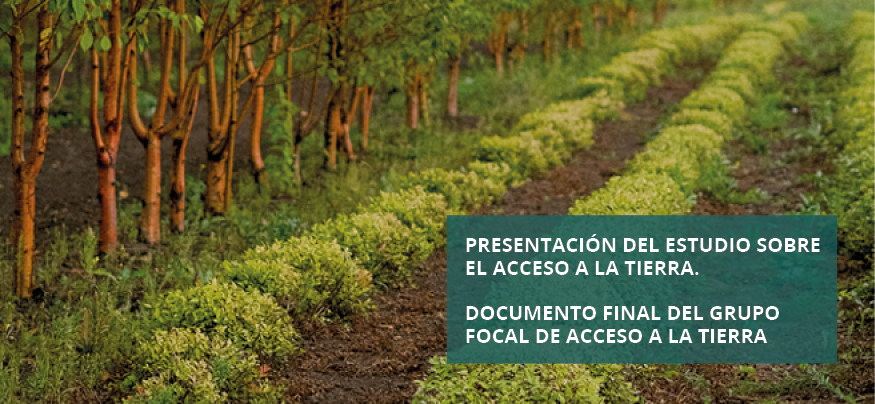
22 de January de 2021
On January 18, the National Rural Network (RRN) organized a virtual presentation of the "Study on Access to Land. Final Document of the Focus Group on Access to Land." The document, which culminates the Focus Group's analysis and reflection, gathers the opinions of expert members regarding the need to facilitate access to land and the generational renewal of agricultural land.
- The RRN Focus Group has presented its main conclusions and proposals to facilitate access to land and the generational renewal of agricultural land.
- The "Study on Access to Land," the result of collaborative reflection by a multidisciplinary group of experts promoted by the Ministry of Agriculture, Fisheries and Rural Development (MAPA), will serve as a supporting document both for the development of the current CAP Strategic Plan 2021-2027 and for the implementation of future initiatives by stakeholders in the agricultural sector and rural areas.
The Focal Group on Land Access (GFAT), coordinated by José Emilio Guerrero Ginel, professor at the University of Córdoba, is an initiative promoted by the Ministry of Agriculture, Fisheries and Food (MAPA) , with a triple objective:
- Analyze the current situation of access to land in Spain from different perspectives.
- Identify the barriers that young and new farmers encounter in accessing land
- Explore possible practical solutions to the problem that will contribute to the development of new, young professionals who maintain the family farming model.
Constitution
Since its formation in early 2020, the GFAT has brought together more than 30 experts to address the complex issue of land access from a multidisciplinary perspective . GFAT members come from diverse backgrounds, including the General State Administration (MAPA, FEGA, General Directorate of Cadastre), regional and municipal administrations, the agricultural sector (Professional Agricultural Organizations, cooperatives), Operational Groups, Local Action Groups, public-private networks, academia, and the financial sector.
Carolina Gutiérrez Ansótegui, Deputy Director General of Rural Development, emphasized the priority that generational renewal and access to land for young and new farmers and ranchers represent for the MAPA. " Cooperation, collaboration, and integrated design, the need to address and facilitate the transfer of farms, to review and update regulations and simplify procedures, as well as the importance of delving into aspects such as training, advice, support, mentoring, and information for young people are some of the key ideas that emerge from this study."
Difficulties and opportunities
When accessing land, young farmers and ranchers encounter difficulties as a result of:
- the emotional value of land that prevents transmission outside the family environment,
- high tax pressures on the purchase and sale of land,
- lack of information or
- increased competitiveness and land grabbing, among others.
In this context, however, there are opportunities and initiatives such as:
- land banks,
- joint management initiatives or
- the test-agroforestry spaces.
Presentation day
During the day , the coordinators of the six subgroups created within the Focus Group shared the main conclusions drawn from each area of study.
- Subgroup I “ Land transfer policies and land use planning” has identified three lines of action:
i) Reform and update the regulatory framework so that it can adapt to reality and focus on solving the problem of land abandonment.
ii) Update the farm registry by addressing the problem from a territorial perspective and integrating mixed farms.
iii) Be inclusive in the generational renewal model, also promoting extra-family renewal and taking advantage of pre-existing social ties between rural and urban areas.
B) Subgroup II “ Agricultural policies: CAP and regulations in Spain” has highlighted:
i) The need to establish a definition of the genuine farmer within the CAP framework, to achieve a more inclusive figure, and to consider the figure of an active forester or agro-forester.
ii) The need to review Law 19/1995 on the modernization of agricultural holdings and its definition of professional farmer.
iii) The importance of encouraging early cessation of activity at age 65 and linking it to the establishment of a young person.
C) Subgroup III, " Training and Access to the Agricultural Profession," highlighted the need to improve advice on management and investment viability for farms and land purchases. It also highlighted the following among its proposals:
i) Promote spaces and resources to test ideas and projects in a practical way before joining the activity.
ii) Promote mentoring or support programs linked to practical training and the adaptation of young people to real exploitation.
D) Subgroup IV “ Analysis of initiatives” has recommended directing actions to facilitate access to land towards:
i) An incentive-based rather than a punitive approach (via aid or favorable tax measures).
ii) Greater support from the administrations and through the figure of the mediator or facilitator with a one-stop information and advisory system for each territory
iii) Joint management models , such as common land management initiatives or agricultural equipment cooperatives.
iv) Cooperation between administrations and private actors and the preference for advancing through guidelines, good practice guides and recommendations.
E) Subgroup V “ Financing and taxation” has mentioned among its proposals :
i) Tax incentives to facilitate access to land, such as social security contributions or tax exemptions for property gains when selling land to young farmers.
iii) Carrying out detailed prior studies to assess the impact of the measures.
iii) Improve the use of opportunities offered by the CAP and make joint use of capital aid with various financial instruments.
F) Subgroup VI “ Access to information” has suggested:
i) Develop a digital platform containing all relevant and necessary information for accessing land and establishing a presence in the sector, and serving as a common resource for all public and private stakeholders at their level of expertise to participate, contribute, and obtain information.
ii) Emphasize the importance of cadastral data and geographic information, as well as having detailed information on the land market.
iii) Highlight the value of data for better decision-making and planning.
The “ Land Access Study. Final Document of the Land Access Focus Group ” can be accessed via the following link:
https://www.mapa.gob.es/es/desarrollo-rural/temas/jovenes-rurales/grupo-acceso-tierra











